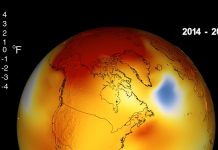Scientists are admitting ocean currents have been speeding up in recent years, dealing a stunning blow to ‘consensus’ climate science claims. For the past 20 years, climate alarmists and the alleged scientific consensus have claimed ocean currents are slowing down, causing harmful and potentially disastrous consequences, and that global warming is to blame.
In the February 5 issue of the peer-reviewed journal, Science Advances, a team of scientists documented the recent acceleration in ocean currents. The article, titled, “Deep-reaching acceleration of global mean ocean circulation over the past two decades,” reports “a statistically significant increasing trend in the globally integrated oceanic kinetic energy since the early 1990s, indicating a substantial acceleration of global mean ocean circulation.”
The article and related media coverage claimed global warming is the reason for accelerating ocean currents. This directly contradicts what they have been claiming for the past two decades.
Climate alarmists have long stated their computer models have consistently predicted global warming would slow down the ocean currents. Hollywood presented the slowdown theory, along with predicted catastrophic consequences, in the 2004 movie, The Day After Tomorrow.
A December 2009 Scientific American article observed, “Most climate change models predict global warming will slow these flows, in part by altering a key component of the Atlantic’s circulation, called deep-water formation.”
The 2009 Scientific American article reported scientists believe a slowdown in ocean currents “will alter African and Indian monsoon rainfall as well as hurricane patterns in the South Atlantic, resulting in ‘a profound impact on the global climate system.’”
Even very recently, alarmists have been repeating, and sensationalizing, their claims of an ocean current slowdown. National Public Radio (NPR) published an article in April 2018 titled, “Atlantic Ocean Current Slows Down To 1,000-Year Low, Studies Show.” The article claimed melting ice from Greenland was the culprit.
The NPR article quoted University College London geologist David Thornally claiming, “The only thing we really can do is obviously try and prevent global warming because that’s the root cause of why we think it’s weakening now with increasing temperatures.”
The NPR article claimed, “scientists agree that [the asserted ocean current slowdown] could have a dramatic impact on ocean ecosystems, such as coral reefs and deep-sea sponge grounds.”
Business Insider published a May 2019 article making similar claims. The article, titled, “The film ‘The Day After Tomorrow’ foretold a real and troubling trend: The ocean’s water-circulation system is weakening,” claimed ocean currents are currently moving slower than at any time in the past 1,600 years. The article quoted a scientist claiming, “We are definitely going into a world where AMOC [Atlantic Meridional Overturning Circulation] is getting weaker.”
Now, these same publications are reversing course, apparently hoping people will have forgotten their previous claims about global warming slowing ocean currents.
Scientific American published a February 6, 2020, article claiming, “Climate change may in part be spurring the acceleration, which could change how heat and nutrients are pushed around the oceans.”
The 2020 Scientific American article claims, “[M]odels suggest that continued global warming may have a growing effect in the future. More climate change may mean a greater strengthening of ocean winds, and potentially even faster ocean circulation.” This is exactly the opposite of what we were previously told models predicted.
Nevertheless, the topic of ocean currents consistently illustrates one truth – climate activists will blame everything on global warming, even if they have to reinvent history and their computer models in the process.
Tiffany Taylor (TTaylor@heartland.org) is an associate policy analyst at The Heartland Institute.

















Why is “global warming” still being discussed? Since 1998 NASA’s satellite measurements have shown no warming except for 2015-2016 Super El Nino. Average satellite/balloon
data showed decline of -0.56 deg C from Feb. 2016 – Feb. 2018. Temperature data from
USCRN shows no stat. sign. warming since 2005 & US avg. for 2019 was less than 2005.
HadCRU4.6 showed 30 year change of +0.29 deg C Feb. 1988-Feb. 2018. This increase
reportedly during Global Warming 1978-1998 (the Global Cooling 1940-1978 was -0.60 deg C Northern Hemisphere. Suggest you check NASA and Zharkova et. al. (2019). We may be headed into a Grand Solar Minimum during 2020-2055.